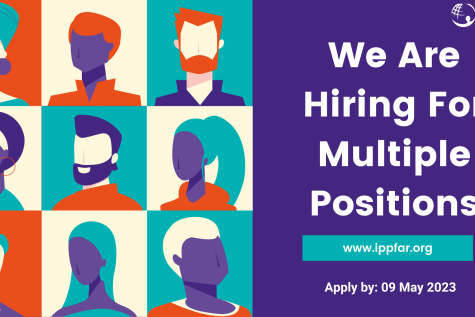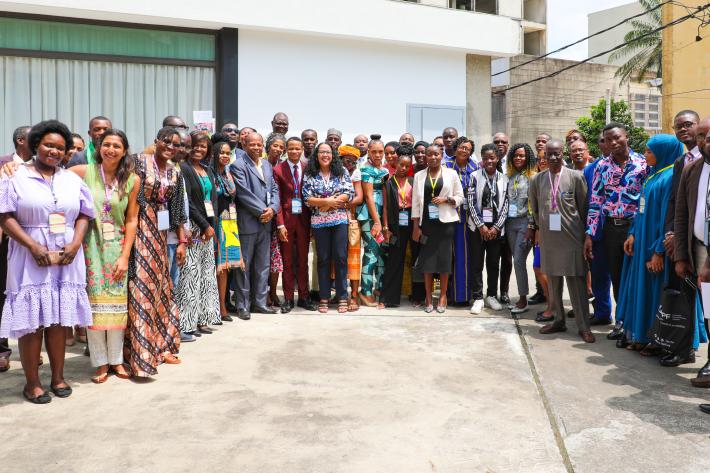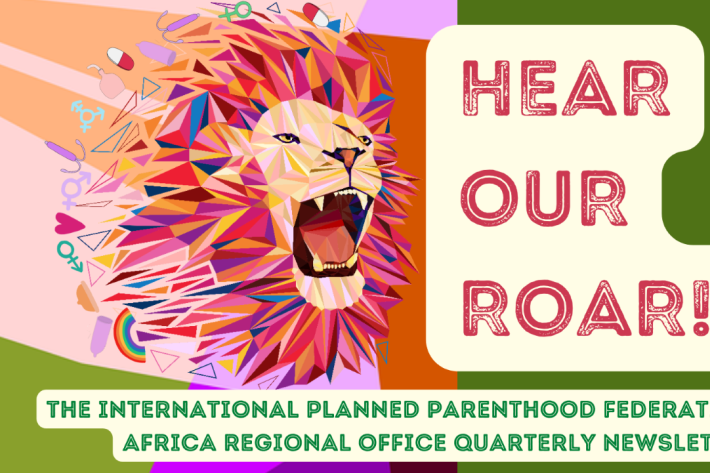
Spotlight
A selection of news from across the Federation

Africa
IPPF Africa Region is seeking talented individuals to support its work
In alignment with its strategy, the IPPF Africa Regional Office is hiring for multiple positions based in Kenya and Côte d'Ivoire.
Filter our news by:


| 29 October 2018
Sexual Gender-Based Violence Services in IPPFAR Member Associations to be Strengthened
IPPF Africa Region recently held a Sexual Gender-Based Violence (SGBV) workshop for over 30 program staff and service providers drawn from selected Member Associations (MAs). The workshop was co- organized by the Gender Unit and the Programmes & Health Systems Strengthening Department. It was aimed at strengthening the capacity of IPPFAR MAs to deliver on SGBV -a major public health concern and human rights issue. SGBV is one of the eight components of IPPF’s Integrated Package of Essential Services (IPES), whose other components include: counselling, contraception, safe abortion care, STIs/RTIs, gynaecology, prenatal care and HIV. Worrying Data According to Dr. Elias Girma -IPPFAR’s Lead Technical Advisor, SRHR Programmes, SGBV statistics from the region are indicative of the rising number of cases (35% to 70% women having experienced physical or sexual violence), which underscores the great need for IPPFAR Member Associations to strengthen their response to survivors. In 2017, IPPF Africa region offered over 1.3 million SGBV services (including referrals). “This worrying data reveals the need for appropriate and effective strategies to address the SGBV challenge in Africa. Provision of a range of essential services to SGBV survivors is one of the most crucial responses, and there are great opportunities for our clinics to ensure that every SGBV survivor receives the appropriate counseling, treatment and support services they need,” he said during the workshop which was held in Nairobi, Kenya. Policy and Legal Environment While noting that the deeply-embedded unequal power relations in society sees more women than men suffer from SGBV, Dr. Girma said that key among the workshop’s objectives was to broaden the service provider’s understanding of the legal and policy frameworks pertaining to gender and SGBV. These comprise key international and regional laws, instruments and agreements. Toward this, Ms. Nathalie Nkoume, IPPFAR's Gender Equality Advisor shared information on various policies, conventions and international frameworks that aim to fight violence against women. She stressed that each government has the duty to protect all SGBV survivors by putting in place respective national frameworks and further providing adequate resources for effective implementation of the legal provisions. Ms. Nkoume also took participants through the IPPF Gender Equality policy, as well as the IPPF gender implementation plans as key reference documents that promote actions towards a transformative agenda for equality of outcomes, opportunities and rights. Visit to the KNH GBV Recovery Center To better understand how an ideal GBV center within a health facility operates, the participants -drawn from 12 African countries (Cote d’Ivoire, Ethiopia, Kenya, Uganda, Malawi, DRC, Eswatini, Zambia, Togo, Mali, Chad, and Cameroon) visited the Kenyatta National Hospital (KNH)’s Gender-Based Violence Recovery (GBVR) Center in Nairobi. This is a model health facility that offers comprehensive management of GBV. At the recovery center, participants were taken through the process of handling a client who presents with a GBV complaint or need, and the range of services offered to them. These services include: screening and examination, treatment for physical injuries, laboratory tests, collection of forensic evidence, counseling (including trauma counseling) and psychosocial support. On a need basis, the clients are linked to safe houses (shelters), support groups and law enforcement agencies. The GBV survivors are also offered post-rape care services such as treatment for Sexually Transmitted Infections (STIs), emergency contraceptive pills -to help reduce chances of unwanted pregnancies, as well as Post-Exposure Prophylaxis (PEP) -antiretroviral drugs which, if taken properly, significantly reduce the risk of HIV infection by 80%. Comprehensive Package of Care The head of the Mental Health Unit at KNH GBVR Center, Dr. Margaret Makanyengo stressed on the strong referral mechanism within the hospital that ensures the survivor gets a comprehensive package of care. “Different units within the hospital work closely together to ensure the client is offered all the services they need. These services are provided to the client in a confidential manner. The service providers strive to uphold the dignity of the clients, while assuring them of their safety and security within the hospital precincts,” she said. Following their visit to KNH’s GBVR center, participants shared some of their feedback. “Seeing how different departments all work together to smoothly deliver services to the client is impressive. There are different entry points of identification for the GBV survivors such as the maternity, the Comprehensive Care Center, the casualty, the youth center and the mental health department. This ensures that no client is left out, and it is something that we as health service providers need to think seriously about, with regard to our facilities,” said Rebecca Zawedde, a participant from Reproductive Health Uganda (RHU). Her sentiments were shared by Cathy Zoa, a participant from Cameroon. “I return to my work station with a lot of lessons learnt from KNH. Right from the triage, the clients are well received by the nurse. The facility is well-branded and the rooms, which are exceptionally clean, are in secure areas which is very important for SGBV survivors. In addition, the reception area at the GBVR center is very warm and welcoming. This is very important to the client. I also admired the zeal with which the service providers undertake their work. You can tell they are very knowledgeable about their areas of expertise and are very passionate about what they do. They have really inspired me,” she said. Data Collection and Management Mr. Paulin Tra, IPPFAR’s Technical Manager -Performance, Knowledge and New Technology shared information on the power of data collection and management, and the key role they play in improving SGBV programs. He also shared trends of SGBV performance in the IPPF Africa Region, verses other SRHR services offered by MAs in the same region. Population Council, an organization that has undertaken extensive research on SGBV shared several study results on SGBV. The organization has also helped create a regional SGBV network. Improved SGBV Service Provision in MA Clinics Following the training, the participants thoroughly analyzed the SGBV components in their programs, taking note of the weaknesses, strengths and areas of improvement. In their action plans, some of their improved strategies for strengthening the SGBV components will include routine screening for SGBV, training of service providers on the respective national SGBV protocols, more engagement of boys and men in the SGBV response, and heightened awareness creation of SGBV -which will largely be undertaken by volunteers and peer educators at the community level. Other aspects will include the forging of partnerships at the community and national level with different stakeholders such as the government, grassroots organizations, cultural custodians, religious leaders, and other influential institutions. Sylvia Auma of Family Health Options Kenya (FHOK) was inspired to begin instituting changes back at the Family Care Medical Center in Jerusalem estate, located in Nairobi’s Eastlands area. “I have gained a lot from this workshop. The most important thing I have learnt is that responding to the unique needs of SGBV survivors in our health facilities does not have to be complicated. When I return, I will share all the information I have learned from this workshop with my colleagues. I will particularly ensure that our triage service is functional, as this can be entry point for identification of potential SGBV survivors or those at risk of abuse. I believe we have the capacity to attend to their sensitive needs with the already existing resources that we have at our clinic,” she said. Story by Maryanne W. Waweru, Governance and Compliance Officer, IPPF Africa Region Also Read: Newly Launched! State of African Women Report: Key Findings For more information about the work of IPPF Africa Region, connect with us on Facebook and Twitter.











